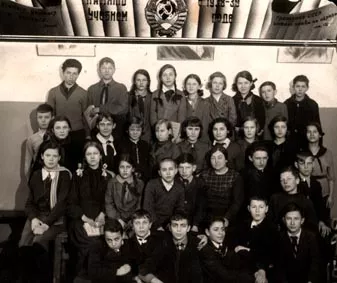Alexander Tsvey with his schoolmates
This is the 6th grade of Moscow secondary school, where I, Alexander Tsvey studied. The year of 1939. I am the last to the left in the bottom row. My friend Vladimir Beilin is next to me.
I was born in 1925 in the town Volyntsy. I was named Israel after my deceased maternal great grandfather. I do not know what was the reason of the tiff between my parents. All I know is that they separated in 1927. My father died from lung tuberculosis in 1927. He was buried in Volyntsy. I do not know where his grave is. Mother did not tell me hardly anything about father.
Mother's elder brother Efim finished vocational school. Then he left for Moscow. He must have insisted that mother also moved with him to Moscow. We had nothing to live on, so mother found a job àt sugar mill as a packager. I did not have a baby-sitter, so I went to work with mother. I was in the workshop observing the assembly line with sugar bales. In spite of the fact that mother was lonely and worked hard, she remained brisk and cheerful. Her life was extremely difficult, but I never remember her being despondent. In general, all Perlovs, including my mother were very energetic and vivacious.
In 1930s was a dreadful starvation in Ukraine, there was hunger in Moscow as well. We were famished. A lump of sugar was a rare dainty for me. Couple of times mother got the cards for the canteen for the privileged workers. We had a lavish meal there. I remember when I was in the metro in 1935, I saw a man eating a candy. My eyes looked so hungry and wretched that mother promised to buy me a candy. On Sundays we went for lunch to our relatives, usually to uncle Efim, mother's eldest brother. He was more well-off than others.
In summer mother took me to the dacha [summer house] of her acquaintances. When I was 6, she managed to send me to the children's spa in Crimea. I was afflicted with lung disease because of constant malnutrition. Mother was very worried. She sent me to winter and summer sanatoriums in the forest. Life was hard on mother and I. She often said that she was mother and father for me. Mother left father when she was 25 and she never got married again. She feared that my step father would not treat me the way she would like to. She adored me and I doted on her as well. In 1938 children's board terminated its work and mother went to work in city park as a director.
I went to school, when I turned 8. I made new friends there. A Russian boy Volodya Belin was my chum. I was a good student. Mother kept on telling me if I wanted to achieve anything in my life I should study well. I preferred sciences at school and mathematics was my favorite subject. When I was in the 7th grade I was the only student from school who was sent to the town Olympiad in mathematics and I took a prize. I did not feel Anti-Semitism at school. Both teachers and my peer treated me very well. At that time nationality was of no importance. I even did not know whether there any other Jews in my class. I did not feel any inferiority complexes because of my nationality. I did not feel myself harmed of lower-class. I was confident. I was a pioneer and Komsomol member. My mother and I were very poor at that time. When I was in the 7th grade there was a party at school and I did not have anything dressy. All my pants were patched and short. I wore them everyday, but I wanted to dress up on the holiday. I went to uncle Fyodor and he gave me his pants. Uncle was of short height and his pants were ankle length to me. I lowered the belt and wore them on the party.


















